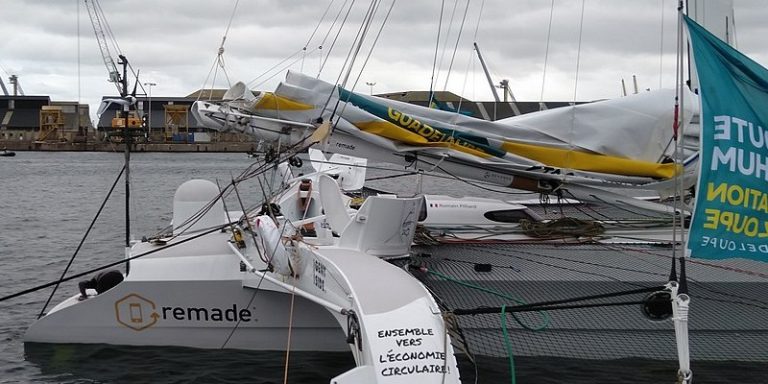
The technology consultancy Meritis has joined forces with the team of Sébastien Rogues, skipper of the Ocean Fifty Primonial, as part of the “The boat that flies” project. The aim of this initiative is to combine big data and machine learning in order to exploit all the sailing data in real time and optimise the boat’s performance. The project should be ready this autumn for the Transat Jacques Vabre, which will mark the first full-scale test to prepare the trimaran for the Route du Rhum in 2022.
A collaboration between AI experts and a top athlete
In the summer of 2019, one of the two founders of Meritis, Gilles Duret, and skipper Sébastien Rogues met. The data scientist being passionate about sailing, he proposed to the skipper to exploit the technological know-how of his company to try to improve the performance of his trimaran. That’s how the project “The boat that flies” started.
Loïc Veyssière, a data scientist consultant at Meritis, joined the two members of the programme in October 2019 to contribute his expertise. The three men understood that to optimize the speed of the boat, the management of the data it emits is essential. AI was immediately considered to create an intuitive dashboard.
Gilles Duret explains:
“Sébastien Rogues’ team is one of the forerunners in ocean racing teams in wanting to optimise data management so that the boat gains in performance. Today, we are therefore very happy to participate in this adventure by putting our skills and know-how at the service of this project which democratizes access to modern data analysis technologies in competitive sport.”
A dashboard designed using machine learning
The creation of a dashboard should allow Sébastien Rogues to understand in real time the reactions of the boat according to the environment it is facing (wave size, swell, current, weather conditions, wind speed…). The skipper can have an overview of all this information to adapt and optimize each of his decisions and actions during the races.
About thirty sensors are installed on the trimaran. Thanks to this configuration, Loïc Veyssière was able to retrieve, off-line, a large amount of data from the boat’s environment. All this data was analysed and then transcribed into intelligent statistics.
The platform has been trained: it detects changes, reworks the information by sorting it, cleaning it and correcting it. Each user can then access all the information in a uniform way. The web portal allows the user to select a training session or a race carried out by the skipper and to follow the evolution of the variables (wind speed, heading, angles of inclination, etc.) on a map.
Objective: a high-performance trimaran for the Route du Rhum 2022
The project should be ready by October 2021, for the Transat Jacques Vabre. This competition will be the first full-scale test to prepare the trimaran for the Route du Rhum in 2022. At that time, the team would like the data to be transcribed in real time (and not deferred, as at present) thanks to this dashboard made available to the skipper.
Sébastien Rogues spoke about the project and its objectives:
“This is a totally new project in terms of its nature and ambition. With the help of Meritis, we are in the process of creating a technology that will allow us to communicate with our boat, to understand it and interact with it to push its performance even further. This technology will be deployed in real conditions in 2022 during the Route du Rhum. It’s a great source of pride to be at the heart of this project, especially as the initial results of this great collaboration are already very encouraging.”
In 2021, the project will focus on two themes:
- Development of the web portal: visuals, graphics, functionalities according to the skipper’s needs
- Research and Development: performance of the trimaran through data studies to understand the “optimal” speed according to several parameters (wind angle and strength, effect of swell, impact of autopilot, etc.)
AI and sport is a trendy theme that will be the main topic of the fourth issue of our quarterly, available soon.
Translated from “Le bateau qui vole” : une intelligence artificielle au service de la navigation de compétition









